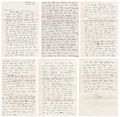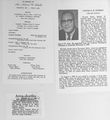Category:Wisconsin Lutheran Seminary, Mequon, WI
From CowTales
Some letter Ralph Baur wrote while attending Sem are on Sem Letter Head stationary. The name is Evangelical Lutheran Theology Seminary, Thiensville, WI.
The Sem explains the discrepancy in names this way. "In 1959 the synod in convention adopted the name "Wisconsin Evangelical Lutheran Synod" and changed the name of the seminary to "Wisconsin Lutheran Seminary.""
In conclusion, there is appended below a list of all the professors who have served our Seminary, together with their time of service:
- E. Moldehnke, 1863–1866, in Watertown
- Adolf Hoenecke, 1866–1870 in Watertown; 1878–1908 in Milwaukee and Wauwatosa
- Eugene Notz, 1878–1902, in Milwaukee and Wauwatosa
- A.L. Graebner, 1878–1887, in Milwaukee
- G. Thiele, 1887–1900, in Milwaukee and Wauwatosa
- John Ph. Koehler, 1900–1929, in Wauwatosa and Mequon
- August Pieper, 1902–1940, in Wauwatosa and Mequon
- John Schaller, 1908–1920, in Wauwatosa
- R. Adelberg, special instructor in English, 1896–1900, in Wauwatosa
- J. Jenny, special instructor in English, 1900, in Wauwatosa
- Hermann Meyer, 1915–1920, in Wauwatosa
- William Henkel, 1920–1929, in Wauwatosa
- John Meyer 1920– , in Wauwatosa and Mequon
- G. Ruediger, 1921–1924, in Wauwatosa
- Frederick Brenner, 1929–1940, in Mequon
- Max Lehninger, 1929–1952, in Mequon
- August F. Zich, 1931–1939
- Paul Peters, 1939–
- Adalbert Schaller, 1940–1952
- Edmund Reim, 1940–1957
- Carl Lawrenz, 1944–
- Hilton Oswald, part-time instructor in music, 1945–1961
- Frederic Blume, 1952
- Gerald Hoenecke, 1952
- Arthur P. Voss, 1954–1955
- Heinrich J. Vogel, 1956–
- Armin Schuetze, 1958–
- Martin Albrecht, 1962–
From WELS News
This Day in WELS History: 140 years ago today, August 10th, 1878, the Wisconsin Synod decided to start a Theological Seminary in Milwaukee. The professors chosen for the institution were Rev A. Hoeneke and Rev Eugene Notz with the understanding that the next year a third professor should be appointed.
The Seminary originally began in Watertown, WI, when the 1863 synod convention decided to open a Seminary. Watertown and Milwaukee were the chief rivals when it came to choosing a location. The appointed committee recommended Watertown as the site. Among the points in favor of Watertown were: The geographical center of the Synod, property was cheaper, fewer distractions for the students, the likelihood of more donations of provisions by the many rural congregations in the area, etc. The Seminary was opened September 1863 in Professor Moldehnke’s home with two students, one who soon had to be dismissed. The only student who remained was Albert Siegler, who finished his studies at our Seminary. He later held pastorates in Menomonie, Wisconsin, Columbus, Wisconsin, Lewiston, Minnesota, Two Rivers, Wisconsin, and Norfolk, Nebraska.
The subjects which were taught in the morning were: Dogmatics, Church history, New Testament, and Latin four times a week; German and mathematics twice a week; in the afternoon was Greek, English, Latin, history, geography, and Symbolical Books four times a week; Hebrew twice a week. Friday was used for repetition, debating, criticism, German, Latin and Greek grammar, Homer, and geometry. Friday evening after 8:30 was given to extemporaneous speaking.
During that era, the greatest problem the school had to face was the lack of support. Income for the first year of operation was $1,141.20, expenditures, $1,847.08. Contributions of food were more liberal, especially of flour, some of which could be sold. The lack of financial support was largely due to the poverty of the people, aggravated by the Civil War. There was an increase of enrollment the second school year. Fourteen students entered at the beginning, but three later had to be dismissed because they could not meet the requirements. The Synod always had in mind to provide a building of its own for the Seminary and also for the preparatory school or college which was to serve as a feeder. This intention was carried out when Northwestern College was founded. The 1864 Synod Convention took steps to provide a permanent building so five acres were purchased for $600.00. Ground for the new building was broken on July 22, 1864 where Luther Prep is now. The cost was to be around $10,000.00 and except for a few hundred dollars it was debt free on the day of dedication.
The 1869–1870 school year opened with 11 students. Six were released into the ministry in the course of the year, so that in March, 1870, only five students remained. In his report in June, 1869, the Synod president suggested that consideration be given to the advisability of joining our Seminary with the St. Louis Seminary. This was prompted very likely by the small enrollment and the difficulty of financing the work of the Seminary. Their thought was why should separate seminaries be maintained when the two synods (Wisconsin & Missouri Synods) were now in full church fellowship. Six Wisconsin theological students entered the Seminary in St. Louis in March, 1870. The Wisconsin Synod Seminary closed its doors and was now a part of the Missouri Synod institution.
The combining of the two seminaries might easily have become a permanent arrangement. In fact, a situation soon arose which could easily have led to just that. The Synodical Conference, of which the Wisconsin Synod was a charter member, had resolved upon the establishment of state synods with a general theological seminary to be used by all. The Wisconsin Synod, however, was not ready to give up its existence. Therefore, this moved the Wisconsin Synod to consider the reopening of its own separate seminary. The advantages of having its’ own seminary included: It would be possible to recruit more students. Ten to thirty students might be expected. Three theological professors could teach them. They could be better instructed than in a large seminary.
And, on August 10th, 1878 it was decided that the Wisconsin Synod would once again start a Theological Seminary. Two small houses at the northeast corner of Hubbard and Garfield Streets in Milwaukee were rented for seminary purposes at $20.00 per month. Purchase of a more adequate building was authorized. The Board was instructed to purchase the Eimermann Park property on Fond du Lac at 13th and Vine Streets (later used by the Milwaukee Lutheran High School) for $7,000.00 and to have the building on the property remodeled at an estimated cost of $2,500.00. For this purpose $3,395.00 were already subscribed at the time of the convention.
The seminary would again be moved a few years later.
https://www.facebook.com/WELSNews/posts/2131146753820908
<iframe src="https://www.facebook.com/plugins/post.php?href=https%3A%2F%2Fwww.facebook.com%2FWELSNews%2Fposts%2F2131146753820908&width=500&show_text=true&appId=326541547368505&height=428" width="500" height="428" style="border:none;overflow:hidden" scrolling="no" frameborder="0" allowTransparency="true" allow="encrypted-media"></iframe>
Bottom of Page
Pages in category "Wisconsin Lutheran Seminary, Mequon, WI"
This category contains only the following page.
Media in category "Wisconsin Lutheran Seminary, Mequon, WI"
The following 15 files are in this category, out of 15 total.












